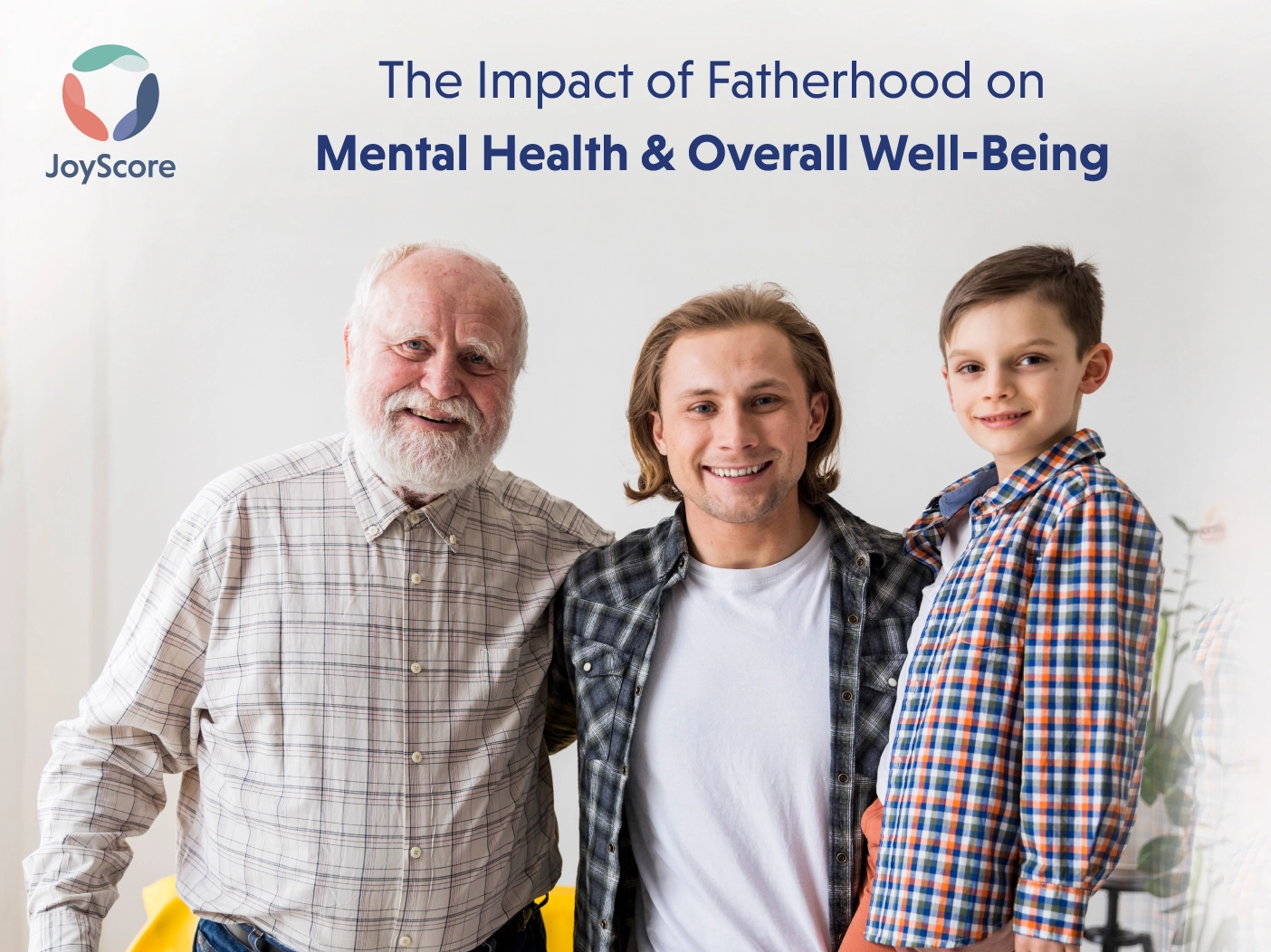The impact of fatherhood on mental health and overall well-being is a topic of profound importance and relevance. While much attention has traditionally been directed towards the physical and emotional changes experienced by mothers, the role of fathers in shaping their mental health and their families cannot be understated. Fatherhood brings many emotions, responsibilities, and challenges, all of which profoundly impact the psychological and emotional state of fathers. The journey of fatherhood has the power to shape a man’s sense of purpose, self-esteem, life satisfaction, and overall happiness. When a man becomes a father, his mental health becomes intricately intertwined with his role as a caregiver, nurturer, and role model.
Download Joyscore to explore the multifaceted relationship between fatherhood and mental health, shedding light on the transformative nature of fatherhood and its profound effects on the well-being of both fathers and their families.
1. Fatherhood and Mental Health:
Fatherhood plays a crucial role in shaping a man’s mental health. The transition to fatherhood often brings many emotions, including joy, anxiety, and uncertainty. Research suggests that men who actively engage in fatherhood experience improved mental health compared to those who are less involved. Engaging with children can increase a sense of purpose, self-esteem, and life satisfaction, positively impacting mental well-being. Active participation in childcare and building a strong parent-child bond can provide emotional support and improve mental health. Fatherhood and mental health go hand in hand. Fathers who prioritize their mental well-being and actively seek opportunities to bond with their children can live healthier and more fulfilling lives. The impact of fatherhood on mental health extends beyond the individual father, as it also creates a positive environment for the overall well-being of the family. By recognizing and nurturing the vital connection between fatherhood and mental health, society can support fathers in their journey, ultimately contributing to healthier families and communities.
2. Fatherhood and Well-being:
Becoming a father can enhance overall well-being. Taking an active role in parenting nurtures a sense of fulfillment and accomplishment. Spending quality time with children and participating in their growth and development fosters a profound sense of happiness and contentment. Moreover, the bond formed through fatherhood can provide a strong support network and improve overall life satisfaction. Fatherhood and well-being are intertwined, as the role of a father brings fulfillment and happiness to one’s life.
3. Fatherhood and Depression:
Although postpartum depression is often linked to mothers, fathers can also undergo depression following the birth of a child. The pressure to fulfill societal expectations, financial stress, sleep deprivation, and relationship changes can contribute to paternal depression. Recognizing the signs and seeking support are crucial for fathers to maintain good mental health and address any depressive symptoms promptly. Open communication and seeking help play a vital role in overcoming fatherhood-related depression.
4. Fatherhood and Stress Management:
Fatherhood often introduces new responsibilities and challenges, which can increase stress levels. Balancing work commitments, parenting duties, and personal life can be overwhelming. However, actively managing stress is essential for a father’s well-being. Adopting healthy coping mechanisms such as exercise, seeking support from loved ones, practicing mindfulness, and maintaining a positive outlook can help fathers navigate the challenges of parenthood more effectively. Fatherhood and stress management go hand in hand as fathers strive to find a balance and manage stress for their well-being and families.
5. Fatherhood and Work-Life Balance:

Finding a healthy work-life balance is essential for fathers’ mental health. Juggling career demands and family responsibilities can be demanding, leading to stress and feelings of guilt. Creating open lines of communication with employers, setting boundaries, and prioritizing family time are vital steps in achieving a sustainable work-life balance. Flexible work arrangements and paternal leave policies can also support fathers in managing their professional and parental roles effectively. Fatherhood and work-life balance are essential components for fathers to lead fulfilling lives.
6. Fatherhood and Emotional Bonding:

Active engagement in fatherhood fosters emotional bonding with children. Spending quality time, participating in activities, and providing emotional support contribute to developing a strong bond between fathers and their children. This emotional connection positively impacts fathers’ mental health, promoting a sense of fulfillment and happiness. Fatherhood and emotional bonding are interconnected, as fathers nurture emotional connections with their children for the well-being and emotional development of their children.
7. Fatherhood and Emotional Health:
Fatherhood offers an opportunity for personal growth and emotional development. Nurturing a child’s emotional well-being helps fathers become more attuned to their emotions and develop greater emotional intelligence. This enhanced self-awareness and empathy can improve fathers’ emotional health, enabling them to form healthier relationships and cope with life’s challenges more effectively. Fatherhood and emotional health are closely linked as fathers prioritize their emotional well-being for themselves and their families.
8. Fatherhood and Psychological Well-being:
Active involvement in fatherhood has a significant impact on fathers’ psychological well-being. Engaging in activities with children, fostering communication, and providing emotional support promote a sense of fulfillment, purpose, and meaning in life. Positive experiences as a father contribute to enhanced self-esteem, reduced stress, and increased overall psychological well-being. Fatherhood and psychological well-being are inseparable, as fathers prioritize their mental health for a fulfilling and meaningful life.
Summary:
Fatherhood has a profound influence on a child’s life. Here are key points for fathers to consider:
1. Acknowledge the Impact: Embrace the transformative changes that come with being a father and recognize the importance of prioritizing mental health.
2. Active Involvement: Actively participate in your children’s lives. Engage in activities, spend quality time, and be present for their growth and development. Active involvement promotes a sense of purpose, self-esteem, and life satisfaction, positively impacting mental well-being.
3. Develop Emotional Bonds: Invest time and effort into building strong emotional bonds with your children. Engage in open communication, provide emotional support, and create a nurturing environment. Strong emotional connections contribute to your own mental health and support the emotional development of your children.
4. Address Challenges: Fatherhood brings challenges, including societal expectations, financial stress, and changes in relationships. Recognize the pressures and seek support when needed. Addressing and managing challenges, such as paternal depression, is crucial for maintaining good mental health.
5. Work-Life Balance: Strive for a healthy work-life balance. Set boundaries, communicate openly with employers, and allocate quality time for family. Balancing career demands and parenting responsibilities reduces stress and promotes mental well-being.
By incorporating these points into their lives, fathers can enhance their happiness and overall well-being. Prioritizing mental health, actively engaging with children, nurturing emotional bonds, addressing challenges, and maintaining a healthy work-life balance are key steps in being a happy and healthy father.



